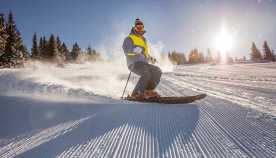AARP Eye Center
- right_container
- Health
- Money
- Work & Jobs
- Social Security
- Medicare
- Caregiving
- Games
- Travel
- More...
- Entertainment & Style
- Family & Relationships
- Personal Tech
- Home & Living
- Auto
- Staying Sharp
- Podcasts
- Videos
Saint Paul Rodeo
History
The small farm community of St. Paul, Oregon with a population under 400, is located in the heart of the Willamette Valley, 20 miles from Salem, the State Capital, and 30 miles southwest of Portland. The area for 20 square miles around St. Paul is some of the most fertile irrigated farm land in the country. Farmers raise a great diversity of crops here including grasses, grains, nursery, hops, fruits and vegetables.
It was in this setting in 1935 that eight local farmers and businessmen conceived the idea for the St. Paul Rodeo. These eight originators were Bill Smith, Ray Manegre, John McKillip, Carl Smith, Maurice Smith, Jim Gooding, Ralph Butts, and Ed Unger.
The Early Years
The City Park, a baseball diamond surrounded by scotch broom and littered with tin cans, was cleaned up and a pole fence built around a short quarter mile track. Four bucking chutes and a roping chute were added, and the locals went looking for stock for a rodeo to be held July 4, 1936.
Bill Smith was the first President of the fledgling organization and the ramrod in getting things going. He farmed with a great number of horses and from his herd came several of the bucking horses used the first few years. One of them, St. Paul Special, was used in the Christensen Bros. rodeo string for several years.
Word was out! And that first year cowboys came from all over Oregon, 50 of them strong, to compete for a rip-roaring purse totaling $500. There were bareback and steer riding events and roping competitions using the new chutes. Saddle broncs were blind-folded and "snubbed" to a 2,000+ pound draft horse in the arena. The competitor's job was to saddle the bronc, mount, and ride. Local folks pitted their fastest teams and bravest drivers against each other in tumultuous hop buggy and chariot races. Trick riders and trick ropers provided additional colorful and exciting entertainment.
Supplementary entertainment was available in the Park where numerous carnival food, beverage, and game vendors provided good times. There was an ever-popular gambling tent where poker, blackjack, and slot machines entertained adults who considered themselves lucky and figured they could "beat the odds". St. Paul was remote enough that this type overt activity went "unnoticed" by the authorities. Rumor has it that the local Mayor's wife was a regular patron of this tent and fully enjoyed her attempts to outsmart the machines! This diversity of wild and colorful entertainment provided just the diversion needed in a time when thoughts focused on the unknowns of a war abroad.
In 1937, the custom of having "royalty" represent and promote the rodeo became part of local tradition. Virginia Ernst was St. Paul's first queen; she served in 1937 & in 1938.
Ray Manegre was elected president after the untimely death of Bill Smith in 1938: He lead in that capacity from 1939 until 1955. During his tenure, the rodeo grew up! In 1940, lights were added for night rodeos, and purses were increased. The St. Paul Rodeo Association became affiliated with the Northwest Rodeo and International Rodeo Associations as it continued to flourish. Growing crowds prompted construction of a new grandstand, bleachers and bucking chutes in 1945 which provided 6,000 covered seats and 3,000 bleacher seats. In 1956, we added another section of covered grandstand to bring us to our present total seating capacity of 10,500.
In 1955, John McKillip, Sr., another of the original founders, became the third president of the rodeo association. Progress continued. In October, 1962, the area experienced a cyclone windstorm with winds to 130 miles per hour which demolished one of our bleacher sections. In the spring of '63, that was replaced; updating continued the following year when the old bucking chutes were replaced with a new 10-chute pipe and metal setup. The announcer's stand above the chutes was updated and enlarged, also.
In 1971, the organization's by-laws were changed to reflect its evolution and the need for consistent and continuing management. The St. Paul Rodeo remains a non-profit corporation with its main goal to produce the finest world class rodeo in the country. The Board of Directors is composed of nine strong minds elected from the membership, and it leads a troupe of 320 members who volunteer their time, effort, and expertise to produce one of the 20 largest rodeos in North America. In 1998, the purse at St. Paul was $190,000.
Community pride produces clean, well-kept, well-painted surroundings for the cowboys and our guests and patrons. The St. Paul Rodeo is highly respected in the world of rodeo. In 1991, the PRCA cowboys gave the St. Paul Rodeo a plaque proclaiming it the finest rodeo in the Northwest. In 1995, the Association added a world class western art show to the features offered during the days of celebration. The St. Paul Rodeo will continue to bring a slice of the old West to the north Willamette Valley each 4th of July and to give those who attend a look at one of the nation's finest professional rodeos and some of the most exciting and colorful entertainment offered anywhere.
AARP Events for Saltillo
-
Featured Event
Moving With Milly for Improved Mobility
Monday, Mar 10, 2025 at 11:00 a.m. ET
Online Event
-
Featured Event
Moving With Milly for Improved Mobility
Monday, Mar 17, 2025 at 11:00 a.m. ET
Online Event
-
Featured Event
Yoga & Mindfulness Series: Gentle Movement
Thursday, Mar 20, 2025 at 1:00 p.m. ET
Zoom
Online Event

New Pricing Coming in 2025.
This is AARP's first rate increase in 15 years.
Don't miss out, join today and save!































.jpg?crop=true&anchor=13,195&q=80&color=ffffffff&u=lywnjt&w=2008&h=1154)




























